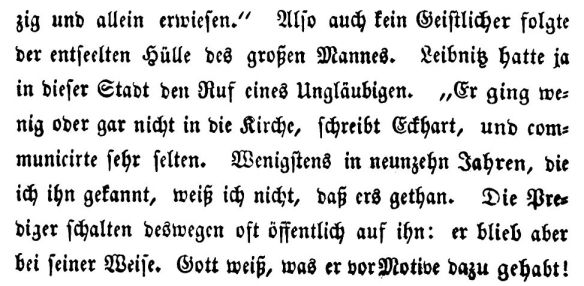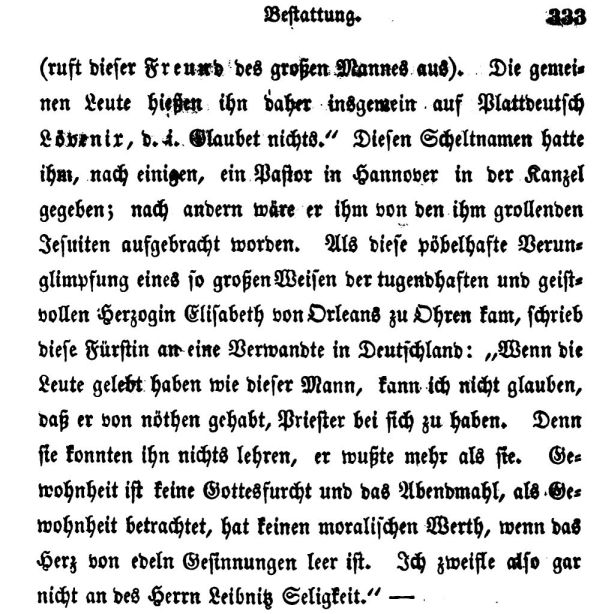

We leave aside the fact that all the philosophies of the past without exception have been accused by the theologians of abandoning the Christian religion, even those of the pious Malebranche and the divinely inspired Jakob Böhme, and that Leibniz was accused of being a “L÷wenix” (a believer in nothing) by the Brunswick peasants, and of being an atheist by the Englishman Clarke and other supporters of Newton.
— Karl Marx, Rheinische Zeitung, No. 193, July 12, 1842, Supplement
But the townspeople and the aristocrats in Hanover looked at him with suspicion, calling him a “Löwenix” — one who “believes nothing.”
— Marc Bobro, The Optimistic Science of Leibniz
[....] But a study of the relevant manuscripts, many of which have been edited since Russell wrote, leaves no room for doubt that Leibniz was a sincere believer; admittedly he was not much of a churchgoer, but he certainly was no atheist. 9 The “esoteric” philosophy, which Russell says was left unpublished in Leibniz’s desk, turns out to be all of a piece with the exoteric doctrine he put before the public. 10
We are told, however, that in Hanover Leibniz did have the reputation of a nonbeliever. “He went to church seldom or not at all,” writes Eckhart, “and took Communion very infrequently. At least in the nineteen years I have known him I donʼt know of his doing it once. The clergymen often berated him publicly for this, but he stuck to his ways.” 11 Consequently the common people called him in Plattdeutsch “Loevenix,” that is, Glaubt nichts, “believes nothing.” 12 This opinion may have been reinforced by the report that Leibniz refused, even on his deathbed, to take Holy Communion. 13 But such rumors are irrelevant to the question of his sincerity, for at that time the general public in Hanover knew no more about his philosophical doctrines than they do now. 14
9 In the preface to the Theodicy (G VI25, H 49-50), Leibniz contrasts unfavorably the "outward expression of religion" with "consideration of the inner essence of [religious] theory."
10 This is conclusively argued by Blumenfeld (1981).
11 Guhrauer 2, 332.
12 Op. cit, 333.
13 Op. cit, 329. See p. 30.
14 Unless I am mistaken, the average Hannoveraner today tends to associate the name “Leibniz” first of all with a kind of cookie, the so called Leibniz-Keks.
SOURCE: Mates, Benson. The Philosophy of Leibniz: Metaphysics and Language (New York: Oxford University Press, 1986), p. 16.

 |
SOURCE: Guhrauer, G. E. (Gottschalk Eduard), 1809-1854. Gottfried Wilhelm Freiherr von Leibniz. Eine Biographie. 2 vols. (Breslau: Reprografischer Nachdruch der Ausg. 1846; reprinted Hildesheim, 1966), vol. 2, pp. 332-333. [PDF with text: pp. 763-4]
See also:
Gottschalk Eduard Guhrauer - Wikipedia, the free encyclopedia (1809–1854)
Mackie, John M[ilton] (1813-1894). Life of Godfrey William von Leibnitz. On the Basis of the German Work of Dr. G.E. Guhrauer. Boston: Gould, Kendall and Lincoln, 1845.
Letter: Marx to Engels in Manchester; London, 10 May 1870
Robert S. Cohen's Introduction
to
The Social and Economic Roots of Newton's 'Principia' by Boris Hessen
Leibniz & Ideology: Selected Bibliography
Historical
Surveys of Atheism, Freethought, Rationalism, Skepticism, and Materialism:
Selected Works
Popularizing Philosophers: A Selected Bibliography
Positivism vs Life Philosophy (Lebensphilosophie) Study Guide
Home Page | Site
Map | What's New | Coming Attractions | Book
News
Bibliography | Mini-Bibliographies | Study
Guides | Special Sections
My Writings | Other Authors' Texts | Philosophical
Quotations
Blogs | Images
& Sounds | External Links
CONTACT Ralph Dumain
Uploaded 14 September 2022
Site ©1999-2022 Ralph Dumain